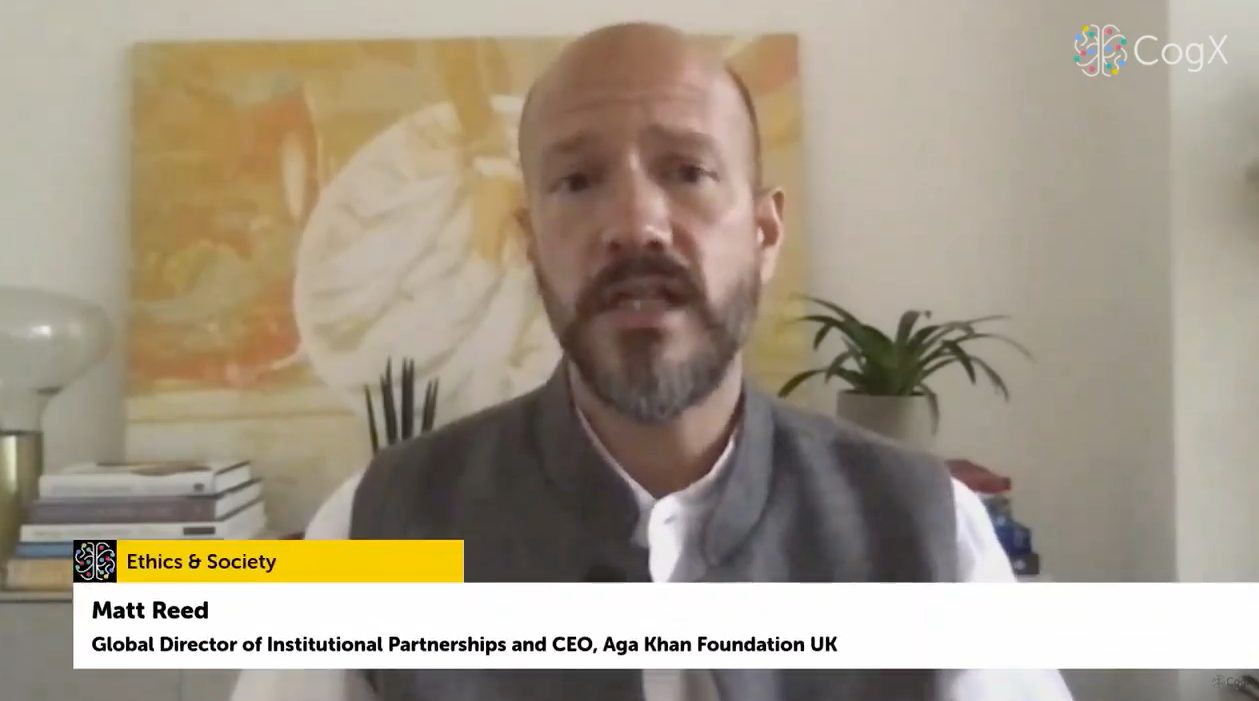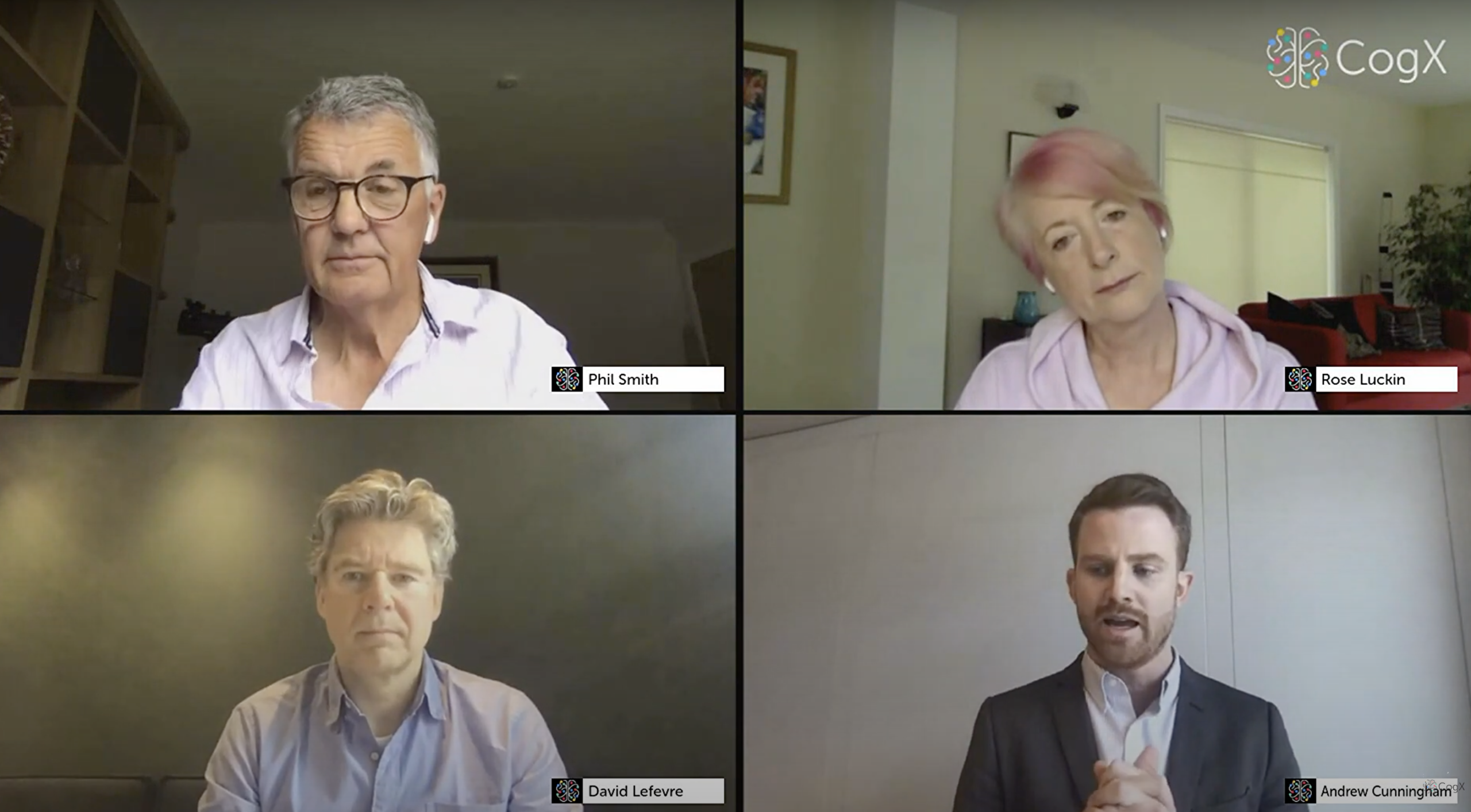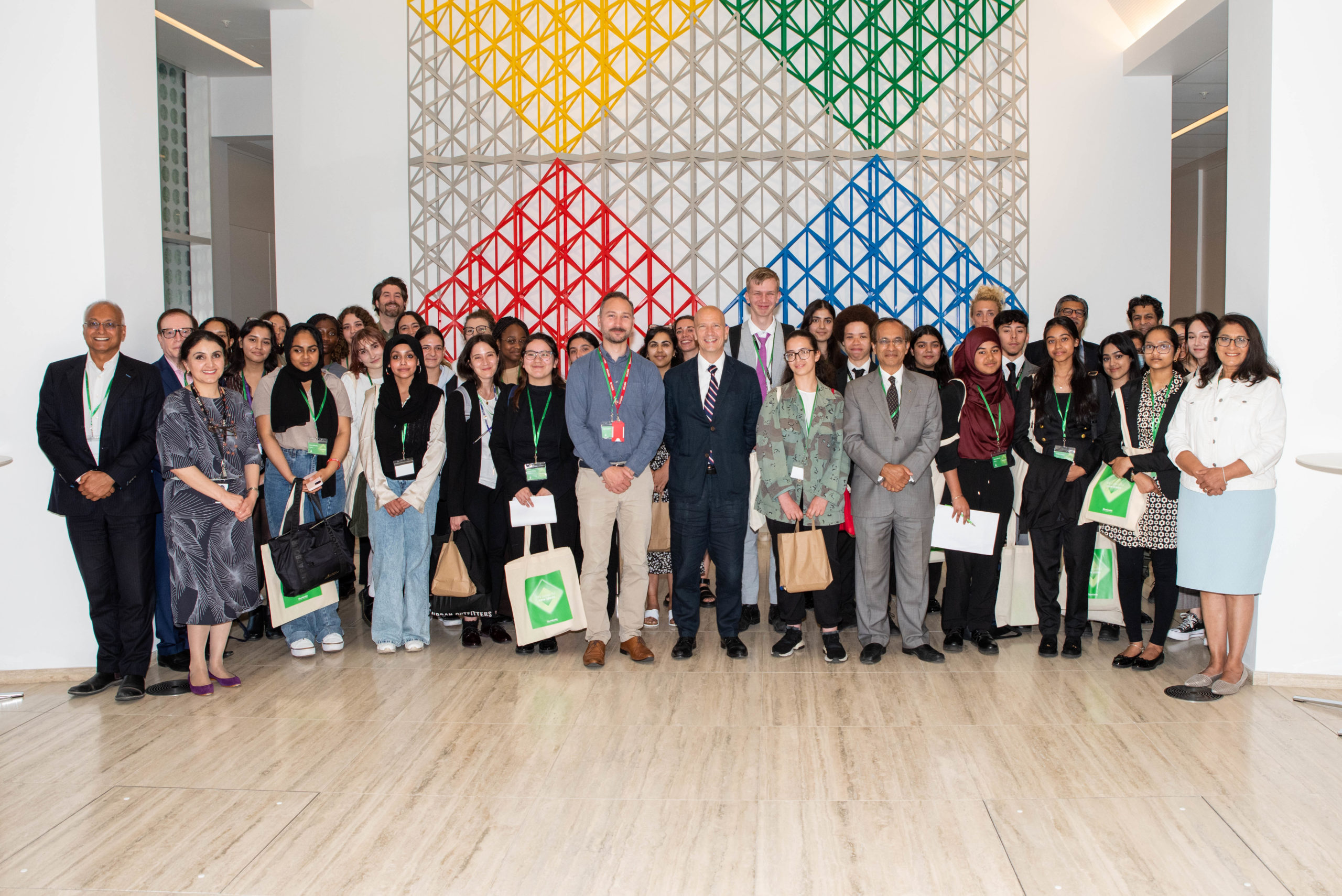AKF was delighted to participate in this year’s CogX; one of the world’s leading technology summits.
Usually taking place in London’s King’s Cross, this year CogX (8-10 June) took its summit online for the biggest, most inclusive and forward-thinking online gathering of leaders, CEOs, entrepreneurs, scientists, artists and activists in the world, all trying answer the question:
“How to get the next 10 years right?”
Speakers included Jane Goodall, John Kerry, Tony Blair, Matt Hancock, Martha Lane Fox as well as the Aga Khan Foundation’s Dr Matt Reed and Dr Andrew Cunningham who spoke on COVID-19 and the SDGs and the future of education respectively.
COVID-19 and the SDGs
Dr Matt Reed, AKF’s Global Director of Institutional Partnerships and AKF(UK) CEO, joined a vibrant conversation moderated by Edie Lush, Executive Director of Hub Culture. Other participants included Adrian Lovett, President & CEO of the World Wide Web Foundation and Gail Gallie, Co-Founder of Project Everyone.
Healthcare support
Matt Reed kicked off the discussion by explaining how AKDN – in particular its three healthcare agencies working at community, secondary and tertiary level – had mobilised quickly in response to the pandemic and had taken on a vital role assisting governments and healthcare systems that threatened to be overwhelmed by COVID-19 patients.
He went on to suggest that whilst the focus of the Millenium Development Goals had been on stopping major epidemics, such as TB or malaria – noting impressive results – they had not focused as much on general access to healthcare. Dr Reed explained that it was the Ebola outbreak, not COVID-19, that had shown many how vital that primary healthcare system is describing how unfortunately many of these systems had been poorly maintained and in decline over the past few decades, not just in the developing world but also in Europe.
“Your best insurance during a pandemic is the primary healthcare system.”
Girls’ education and COVID-19 – the Afghanistan context
Through the lens of AKF’s long-standing work promoting girls’ education in Afghanistan, Dr Reed explained some of the barriers that girls face there, both ideologically and practically. He went on to describe how COVID-19 had impacted this work, and the girls themselves, who were cut off both from their schooling but also from the psychosocial support of being around teachers and peers.
He then explained some of the ways AKF has used technology to overcome these issues, including mobilising a WhatsApp group for girls with access to a phone. He also described how a combination of technologies have been leveraged to provide support groups and knowledge sharing facilities for AKF educators and education programme designers/implementers, working in similar contexts across the globe. Dr Reed also underlined how important it is that we remain vigilant to the threats faced by young girls accessing education, and how remaining connected to them was as vital now as it has ever been.

Partnerships
In response to a question about the 17th SDG – partnerships – Dr Reed welcomed seeing businesses, philanthropy, governments and civil society working together in the face of the pandemic. He went on to say how AKDN had been approached by the government of Sindh, to cite but one example, to help train nurses on the frontline, and provide vital supplementary support.
He also noted how the sense of urgency around the pandemic has seen partnerships within AKDN’s network, and externally in terms of things like vaccine research, renew their commitments and work together to find solutions to these new challenging circumstances. Dr Reed also noted that a variety of foundations were working together looking at supply chains for distributing a vaccine when one becomes available, to ensure that the world is not reliant on any one factory in such a critical situation. He noted that this level of cooperation had sprung up almost overnight, and it was obviously encouraging to see.
Education 4.0: what will schools of the future look like
The recent lockdown has driven widespread adoption of education technology. In this dynamic discussion, moderated by Phil Smith, Chairman of IQE, Dr Andrew Cunningham, AKF’s Global Lead, Education, discussed best practices for remote learning, digital versus hybrid tools and how the classroom is transforming. Other participants included Rose Luckin, Director of EDUCATE, and David Lefevre, Director of the EdTech Lab at Imperial College Business School.
The future of education
Dr Cunningham began by explaining how the pandemic, and the closure of schools globally, had encouraged education communities to begin thinking about how to build children’s resilience, problem-solving abilities, and their connection to their families, communities and teachers, noting that many curricula do not currently include these important life skills.
He went on to discuss the difficulty in achieving this, particularly in countries where technology, access to phones, or the internet, are severely limited for many. Despite these obstacles, Dr Cunningham suggested that the last few months – which have seen families having to take a far more active role in their children’s learning – has encouraged the beginning of an important dialogue that can start to bridge the gap between what it means to be an educator and what it means to be educated.

Participatory design thinking
As the conversation turned towards how best to create relevant educational tools, particularly in terms of technology, Dr Cunningham offered the panellist a concrete example of how the Schools2030 project has been engaging with stakeholders – ministry officials, teachers, parents and students – to address local concerns in education and ensure that the subsequent solutions would be sustainable and helpful for local contexts. He noted that although this process would have happened in any case, the fact of the pandemic had driven Schools2030 colleagues to truly innovate and reach out across a multitude of platforms to drive the work forward and listen to the needs of the communities in which they work.
“In Bamyan, Afghanistan, when you take away the school, you then take away that one opportunity that these young girls have to actually remember that they are a child”
A sense of belonging
Dr Cunningham turned the panel’s attention to a specific country – Afghanistan – where he noted that AKF, FCDO, and other partners have been implementing one of the world’s largest girls’ education programmes globally. He described how the closing of schools for many young girls there served very much to isolate them, to deny them a sense of belonging to a learning community, and even to remove their options for how their life might progress, away from other routes such as early marriage or child labour.
He described how technology had become vital for allowing teachers and project staff the opportunity to check in with those girls, reminding them that this community still exists for them, even though not perhaps in the same physical way it had before. What’s more, Dr Cunningham noted that the conversation around belonging and wellbeing that had sprung from the lockdown circumstances was in fact a vital opportunity to move the needle on ‘Education 4.0’ towards a more inclusive learning environment.
Education technology
The discussion then turned to the subject of ‘technophobia’, and the moderator asked Dr Cunningham to elaborate on how this plays out in other countries. Dr Cunningham’s response recalled the earlier discussion around participatory design, suggesting that involving teachers from the outset in the design of technological programmes and educational tools ensures that the tech is user-friendly and meets their needs. The pandemic, he noted, had given many the opportunity to look into a teacher’s daily life and understand better what those needs exactly are.
He also urged caution, explaining that we risk “snapping back” to the way things have always been, rather than building on the lessons learned over the last three months. He made the salient point that the EdTech community must be serious about using technology as an equaliser, as well as understanding that schools themselves provide the platform for that equalising. Such commitment would provide a fantastic opportunity to make real progress and build schools for the future that are truly inclusive and truly support children’s needs in a holistic way.




